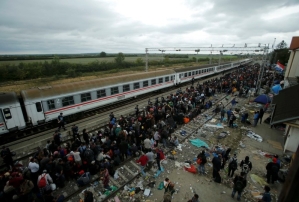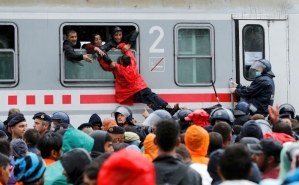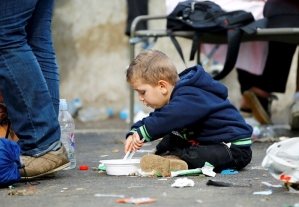BRUSSELS (Reuters) - Bitterly divided European leaders will seek to find a credible response to the worst migration crisis affecting the continent since World War Two, which has tarnished its image as a beacon of peace, at an emergency summit next week.
European Council President Donald Tusk, who chairs EU summits, on Friday called on the 28-country bloc's leaders to stop shifting the responsibility onto others and to build a credible migration policy.
Europe is struggling to deal with the hundreds of thousands of people entering it this year, increasingly across the water from Turkey to Greece and then up through the impoverished Balkans to the former Yugoslavia, of which Croatia and Slovenia are members of the EU.

The influx of migrants, most of them fleeing war and poverty in the Middle East, Africa and Asia, has led to bitter recriminations between European governments and the temporary closure of national borders, undermining one of the most tangible benefits of the Union.
"If you don't cope with this crisis, then I think the EU will fall apart," said a senior EU official.
When they meet in Brussels on Wednesday, European leaders will discuss longer-term strategies for dealing with the migration crisis, such as increasing cooperation for the Middle East to reduce the incentive for refugees to try to reach Europe and boosting aid to the World Food Programme and the United Nations High Commissioner for Refugees.

CEMENTING PEACE
On Saturday, German Vice-Chancellor Sigmar Gabriel said the EU needed to provide 1.5 billion euros ($1.70 billion) to the two agencies to address funding shortfalls.
The EU prides itself on cementing peace among countries that until World War Two fought bloody battles and fostering prosperity by removing internal barriers among its member states through the so-called Schenghen agreements.
But the more than 500,000 people crossing the Mediterranean into Europe this year alone and Hungary's use of water cannon and razor wire on its external border with Serbia have seen the EU's ambitions to act as one fall short.
"The (Schengen) agreements are now part of our daily lives and it is unthinkable that the facilities enjoyed by hundreds of thousands of travelers and cross-border workers in Europe are challenged by nationalist and reactionary thoughts and political actions," said Jean Asselborn, Minister of Foreign and European Affairs for Luxembourg.

As the holder of the rotating presidency of the EU, Luxembourg is working to broker a compromise that can break the deadlock between member states on sharing the burden of the crisis.
EU interior ministers, meeting the day before, are expected to agree on a voluntary relocation scheme to redistribute 160,000 refugees from frontline states across the EU, a fraction of the total entering Europe.
That would allow the leaders to focus on the bigger issues, such as beefing up the EU's asylum agency, Frontex, into a full border and coastguard agency, working on hotspots and a list of "safe countries" whose citizens would not normally qualify for asylum, a senior EU official said.
(Additional reporting by Paul Taylor and Francois Murphy in Vienna; Editing by Janet Lawrence)







